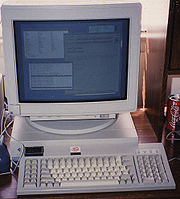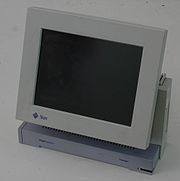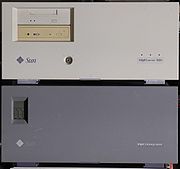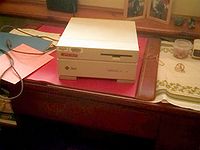
SPARCstation
Encyclopedia


SPARC
SPARC is a RISC instruction set architecture developed by Sun Microsystems and introduced in mid-1987....
-based computer workstations and server
Server (computing)
In the context of client-server architecture, a server is a computer program running to serve the requests of other programs, the "clients". Thus, the "server" performs some computational task on behalf of "clients"...
s in desktop, deskside (pedestal) and rack-based form factor developed and sold by Sun Microsystems
Sun Microsystems
Sun Microsystems, Inc. was a company that sold :computers, computer components, :computer software, and :information technology services. Sun was founded on February 24, 1982...
The first SPARCstation was the SPARCstation 1
SPARCstation 1
The SPARCstation 1, or Sun 4/60, is the first of the SPARCstation series of SPARC-based computer workstations sold by Sun Microsystems. It had a distinctive slim enclosure and was first sold in April 1989, with Sun's support for it ending in 1995.Based around a LSI Logic RISC CPU running at...
(also known as the Sun 4/60), introduced in 1989. The series was very popular and introduced the Sun-4c architecture, a variant of the Sun-4
Sun-4
Sun-4 is a series of Unix workstations and servers produced by Sun Microsystems, launched in 1987. The original Sun-4 series were VMEbus-based systems similar to the earlier Sun-3 series, but employing microprocessors based on Sun's own SPARC V7 RISC architecture in place of the 68k family...
architecture previously introduced in the Sun 4/260. Thanks in part to the delay in the development of more modern processors from Motorola
Motorola
Motorola, Inc. was an American multinational telecommunications company based in Schaumburg, Illinois, which was eventually divided into two independent public companies, Motorola Mobility and Motorola Solutions on January 4, 2011, after losing $4.3 billion from 2007 to 2009...
, the SPARCstation series was very successful across the entire industry. The last model bearing the SPARCstation name was the SPARCstation 20. The series was replaced by the Sun Ultra series
Sun Ultra series
The original Sun Ultra series was a series of UltraSPARC-based workstations and servers developed and sold by Sun Microsystems from 1995 to 2001...
in 1995.
Desktop and deskside SPARCstations and SPARCservers of the same model number were essentially identical systems: the only difference being that systems designated as servers were usually "headless" (that is, configured without a graphics card and monitor), and sold with a "server" rather than a "desktop" OS license. For example, the SPARCstation 20 and SPARCserver 20 were almost identical in motherboard
Motherboard
In personal computers, a motherboard is the central printed circuit board in many modern computers and holds many of the crucial components of the system, providing connectors for other peripherals. The motherboard is sometimes alternatively known as the mainboard, system board, or, on Apple...
, CPU
Central processing unit
The central processing unit is the portion of a computer system that carries out the instructions of a computer program, to perform the basic arithmetical, logical, and input/output operations of the system. The CPU plays a role somewhat analogous to the brain in the computer. The term has been in...
, case design and most other hardware
Computer hardware
Personal computer hardware are component devices which are typically installed into or peripheral to a computer case to create a personal computer upon which system software is installed including a firmware interface such as a BIOS and an operating system which supports application software that...
specifications.
Most desktop SPARCstations and SPARCservers shipped in either "pizzabox
Pizza box form factor
In computing, a pizza box is a style of case for computers or network switches. Cases of this type tend to be wide and flat, normally one or two rack units in height, thus resembling pizza delivery boxes....
" or "lunchbox" enclosures, a significant departure from earlier Sun and competing systems of the time. The SPARCstation 1, 2, 4, 5, 10 and 20 were "pizzabox" machines. The SPARCstation SLC and ELC were integrated into Sun monochrome
Monochrome
Monochrome describes paintings, drawings, design, or photographs in one color or shades of one color. A monochromatic object or image has colors in shades of limited colors or hues. Images using only shades of grey are called grayscale or black-and-white...
monitor enclosures, and the SPARCstation IPC, IPX, SPARCclassic, SPARCclassic X and SPARCstation LX were "lunchbox" machines.

VMEbus
VMEbus is a computer bus standard, originally developed for the Motorola 68000 line of CPUs, but later widely used for many applications and standardized by the IEC as ANSI/IEEE 1014-1987. It is physically based on Eurocard sizes, mechanicals and connectors , but uses its own signalling system,...
chassis); models ending in "90" and the SPARCcenter 2000 came in rackmount cabinet enclosures. The SPARCserver 1000's form-factor was a large rack-mountable desktop unit.
Later versions of the SPARCstation series, such as the SPARCstation 10 and 20, could be configured as multiprocessor
Multiprocessing
Multiprocessing is the use of two or more central processing units within a single computer system. The term also refers to the ability of a system to support more than one processor and/or the ability to allocate tasks between them...
systems as they were based on the MBus high-speed bus. These systems could accept one or two single or dual central processing unit
Central processing unit
The central processing unit is the portion of a computer system that carries out the instructions of a computer program, to perform the basic arithmetical, logical, and input/output operations of the system. The CPU plays a role somewhat analogous to the brain in the computer. The term has been in...
s packaged in MBus modules.
Until the launch of the SPARCserver 600MP series, all SPARCstation/server models were also assigned Sun 4-series model numbers. Later models received S-prefix model numbers.
"Pizzabox" systems
| Name | Model | Codename | Platform | CPU | CPU MHz | RAM (MAX) | Announced | End of Sales | End of Support |
|---|---|---|---|---|---|---|---|---|---|
| SPARCstation 1 SPARCstation 1 The SPARCstation 1, or Sun 4/60, is the first of the SPARCstation series of SPARC-based computer workstations sold by Sun Microsystems. It had a distinctive slim enclosure and was first sold in April 1989, with Sun's support for it ending in 1995.Based around a LSI Logic RISC CPU running at... |
4/60 | Campus | sun4c | Fujitsu MB86901A or LSI L64801 | 20 MHz | 64 MB | 1989 | May 1999 | |
| SPARCstation 1+ | 4/65 | Campus B | sun4c | LSI L64801 | 25 MHz | 64 MB | 1989 | May 1999 | |
| SPARCstation 2 SPARCstation 2 The SPARCstation 2 was a computer workstation. The successor to the SPARCstation 1, it was released in 1990, and manufactured by Sun Microsystems.-Memory:... |
4/75 | Calvin | sun4c | Cypress CY7C601 | 40 MHz | 128 MB | 1990 | Dec 1999 | |
| SPARCstation 10 SPARCstation 10 The SPARCstation 10 is a workstation computer made by Sun Microsystems. Announced in May 1992, it was Sun's first desktop multiprocessor... |
S10 | Campus-2 | sun4m | SuperSPARC I/II or hyperSPARC HyperSPARC The hyperSPARC, code-named "Pinnacle", is a microprocessor that implements the SPARC Version 8 instruction set architecture developed by Ross Technology for Cypress Semiconductor.... |
33, 36, 40, 50, 60, 75, 80, 90, 100, 125, 150, 180, 200 MHz | 512 MB | May 1992 | Oct 1994 | Oct 1999 |
| SPARCstation 5 SPARCstation 5 SPARCstation 5 or SS5 is a workstation sold by Sun Microsystems. It is based on the sun4m architecture, and is enclosed in a pizza-box chassis. A simplified, cheaper version of the SS5 was later released as the SPARCstation 4... |
S5 | Aurora | sun4m | microSPARC II or TurboSPARC TurboSPARC The TurboSPARC is a microprocessor that implements the SPARC V8 instruction set architecture developed by Fujitsu Microelectronics, Inc. , the United States subsidiary of Fujitsu Limited located in San Jose, California. It was a low-end microprocessor primarily developed as an upgrade for the Sun... |
70, 85, 110, 170 MHz | 256 MB | 1994 | Dec 1998 | |
| SPARCstation 20 SPARCstation 20 The SPARCstation 20 is a Sun Microsystems workstation based on the SuperSPARC or hyperSPARC CPU. It was the last model in the SPARCstation family of Sun "pizza box" computers, which was superseded by the UltraSPARC design in 1995.-CPU support:The SPARCstation 20 had dual 50 MHz MBus ports that... |
S20 | Kodiak | sun4m | SuperSPARC I/II or hyperSPARC | 50, 60, 75, 90, 100, 125, 150, 180, 200 MHz | 512 MB | 1994 | Sep 1997 | |
| SPARCstation 4 | S4 | Perigee | sun4m | microSPARC II | 70, 85, 110 MHz | 160 MB | 1995 | Jul 1997 | |
| SPARC Xterminal 1 | S114 | Perigee | sun4m | microSPARC | 50 MHz | 128 MB | March 1995 |
"Lunchbox" systems
| Name | Model | Codename | Platform | CPU | CPU MHz | RAM (MAX) | Announced | End of Sales | End of Support |
|---|---|---|---|---|---|---|---|---|---|
| SPARCstation IPC SPARCstation IPC SPARCstation IPC is a workstation sold by Sun Microsystems. It is based on the sun4c architecture, and is enclosed in a lunchbox chassis.-CPU support:... |
4/40 | Phoenix | sun4c | Fujitsu MB86901A or LSI L64801 | 25 MHz | 48 MB | 1990 | Dec 1999 | |
| SPARCstation IPX SPARCstation IPX SPARCstation IPX is a workstation sold by Sun Microsystems. It is based on the sun4c architecture, and is enclosed in a lunchbox chassis.-CPU support:... |
4/50 | Hobbes | sun4c | Fujitsu MB86903 or Weitek W8701 | 40 MHz | 64 MB | 1991 | May 2000 | |
| SPARCclassic SPARCclassic SPARCstation Classic is a workstation formerly manufactured by Sun Microsystems. It is based on the sun4m architecture, and is enclosed in a lunchbox chassis.- Memory :The SPARCstation Classic has three banks with two DSIMM slots each... |
4/15 | Sunergy | sun4m | microSPARC | 50 MHz | 128 MB | Nov 1992 | May 1995 | May 2000 |
| SPARCstation LX SPARCstation LX SPARCstation LX is a workstation sold by Sun Microsystems. It is based on the sun4m architecture, and is enclosed in a lunchbox chassis.-Memory:The SPARCstation LX has three banks with two DSIMM slots each... |
4/30 | Sunergy | sun4m | microSPARC | 50 MHz | 128 MB | Nov 1992 / Aug 1993 | Jul 1994 | Jul 1999 |
| SPARCstation ZX SPARCstation ZX The SPARCstation ZX is a computer workstation produced by Sun Microsystems and launched in August 1993. It was end-of-lifed in March 1994. The original price was US $19,995.00.... |
4/30 | Sunergy | sun4m | microSPARC | 50 MHz | 96 MB | Aug 1993 | March 1994 | |
| SPARCclassic X | 4/10 | Hamlet | sun4m | microSPARC | 50 MHz | 96 MB | Nov 1992 | May 1995 | May 2000 |
Integrated monitor/portable systems
| Name | Model | Codename | Platform | CPU | CPU MHz | RAM (MAX) | Announced | End of Sales | End of Support |
|---|---|---|---|---|---|---|---|---|---|
| SPARCstation SLC | 4/20 | Off-Campus | sun4c | Fujitsu MB86901A, LSI L64801 or LSI LSIS1C0007 | 20 MHz | 16 MB | Nov 1996 | ||
| SPARCstation ELC | 4/25 | Node Warrior | sun4c | Fujitsu MB86903 or Weitek W8701 | 33 MHz | 64 MB | Oct 1998 | ||
| SPARCstation Voyager | S240 | Gypsy | sun4m | microSPARC II | 60 MHz | 80 MB | Mar 1994 | Dec 1995 | Dec 2000 |
Server systems
| Name | Model | Codename | Platform | CPU | CPU MHz | RAM (MAX) |
|---|---|---|---|---|---|---|
| SPARCserver 330 | 4/330 | Stingray | sun4 | Cypress CY7C601 | 25 MHz | 72 MB |
| SPARCserver 370 | 4/370 | Stingray | sun4 | Cypress CY7C601 | 25 MHz | 72 MB |
| SPARCserver 390 | 4/390 | Stingray | sun4 | Cypress CY7C601 | 25 MHz | 72 MB |
| SPARCserver 470 | 4/470 | Sunray | sun4 | Cypress CY7C601 | 33 MHz | 96 MB |
| SPARCserver 490 | 4/490 | Sunray | sun4 | Cypress CY7C601 | 33 MHz | 96 MB |
| SPARCserver 630MP | S630 | Galaxy | sun4m | Up to four Cypress CY7C601 or SuperSPARC I | 40, 50, 60 MHz | 1 GB |
| SPARCserver 670MP | S670 | Galaxy | sun4m | Up to four Cypress CY7C601 or SuperSPARC I | 40, 50, 60 MHz | 2.5 GB |
| SPARCserver 690MP | S690 | Galaxy | sun4m | Up to four Cypress CY7C601 or SuperSPARC I | 40, 50, 60 MHz | 3.5 GB |
| SPARCserver 1000/1000E | S1000 | Scorpion | sun4d | Up to eight SuperSPARC I/II | 40, 50, 60, 85 MHz | 2 GB |
| SPARCcenter 2000/2000E | S2000 | Dragon | sun4d | Up to 20 SuperSPARC I/II | 40, 50, 60, 85 MHz | 5 GB |

Weitek
Weitek Corporation was a chip-design company that originally concentrated on floating point units for a number of commercial CPU designs. During the early to mid-1980s, Weitek designs could be found powering a number of high-end designs and parallel processing supercomputers...
POWER μP for the SPARCstation 2 or IPX, or the Ross
Ross Technology, Inc.
Ross Technology, Inc. was a semiconductor design and manufacturing company, specializing in SPARC microprocessors. It was founded in Austin, Texas in August 1988 by Dr. Roger D. Ross, a leading computer scientist who headed Motorola's Advanced Microprocessor Division and directed the developments...
hyperSPARC MBus modules rated at clock speeds up to 200 MHz. As mentioned above, some models listed as SPARCstations were also available in SPARCserver configuration and vice versa.

